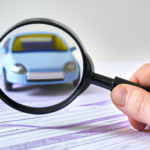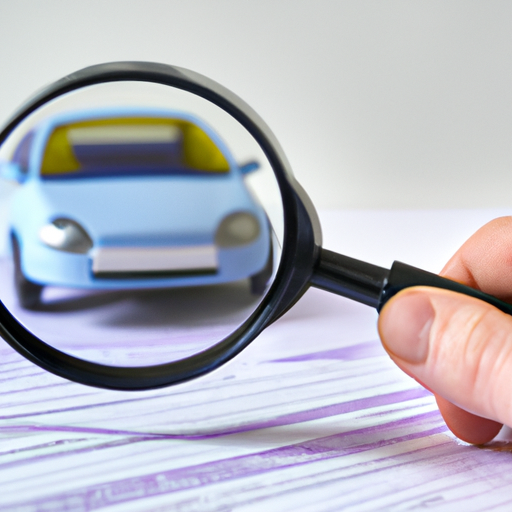Imagine finding the perfect pre-owned car, only to discover it’s had a storied past of accidents, unreported damages or serious mechanical issues—things you were unaware of when you made the purchase. Well, in the world of used car buying, forewarned is forearmed! And that’s exactly what the ‘Guide to Discover Your Car’s Past: Find a vehicle history report‘ is here to help you with. A vehicle history report can provide you with a wealth of information about a car’s past, giving you a clearer picture before you make your important decision. Shield yourself from hidden surprises and join us as we navigate through the steps to uncover a car’s history accurately.
Understanding the Importance of a Vehicle History Report
Purchasing a vehicle is a significant investment and you’ll want to ensure that you’re making the right choice. A critical tool to aid in this decision-making process is a vehicle history report. This comprehensive document provides insightful information about the vehicle’s past, offering clarity and peace of mind before you finalize your purchase.
Knowing the vehicle’s history before purchase
Before putting your hard-earned money into a vehicle, it’s crucial that you’re aware of its history. This includes whether it has been in any accidents, its ownership history, how well it was maintained, and more. Armed with this knowledge, you are better equipped to negotiate the price, understand the car’s condition and confirm that it fits your needs and expectations.
Issues that can be revealed in the report
A vehicle history report can reveal a wide range of issues. This includes any major accidents the vehicle has been involved in, odometer discrepancies, outstanding liens, recall information, and more. Understanding these issues can be key to preventing future headaches associated with ownership and operation of the vehicle.
How it influences the value of the car
The information contained in a vehicle history report can significantly influence the value of the car. Vehicles with a clean report are likely to have a higher value compared to those with a history of major accidents or other significant issues. Therefore, a history report can be instrumental when negotiating the price of a used vehicle.
What Information is Included in a Vehicle History Report
A vehicle history report is likely to contain several important pieces of information, each one adding a piece to the car’s history puzzle.
History of accidents and damages
One of the most essential elements in the report is the history of accidents and damages. This will detail any accidents the vehicle has been involved in and the associated repairs.
Previous ownership details
The report also includes information about previous owners. This includes how many owners the vehicle has had, which can provide insights into how the vehicle may have been cared for.
Theft records
If the vehicle was ever reported stolen, this information will be included in the history report. This is crucial as buying a previously stolen vehicle can lead to legal complications down the line.
Title history
The title history section will reveal if the car was ever deemed a total loss by an insurance company, or if it has a “salvage title”, meaning it was declared a total loss and then repaired.
Recall and warranty information
This shows any outstanding recalls on the vehicle and if it’s under any active warranties, thus giving you an idea of possible future costs.
How to Obtain a Vehicle History Report
Gaining access to a vehicle history report is a pretty straightforward process, here’s how:
Gathering necessary details like VIN
First and foremost, you’ll need to locate and jot down the vehicle identification number (VIN). Usually found on the driver’s side dashboard or inside the driver’s side door, this unique code is essential for obtaining the vehicle history report.
Choosing a relevant service for the report
There are numerous online services that provide vehicle history reports. It’s important to look for one that offers a comprehensive report and aligns with your budget. A few notable options include Carfax, AutoCheck, and National Motor Vehicle Title Information System (NMVTIS).
Steps to order the report
After choosing a service, enter the VIN and follow the prompts to order the report. This usually includes a nominal fee. Once ordered, you should receive access to the report almost immediately.
Understanding Vehicle Identification Number (VIN)
The VIN is a tool that deciphers the unique history and characteristics of a vehicle and is a key component in obtaining a vehicle history report.
What is a VIN?
A Vehicle Identification Number (VIN) is the auto industry’s equivalent to human DNA. This 17-character string of numbers and letters is unique to every vehicle and provides a range of information about the vehicle’s make, model, year of manufacture, and more.
Where to locate the VIN on your car
Common locations to find a VIN include the lower left of your car’s windshield, inside the driver side door, in the rear wheel well directly above the tire, or under the hood at the front of the engine.
Why VIN is important for a history report
The VIN is important for obtaining a history report as it acts as a key that unlocks a wealth of information about the car’s history, these include accident history, title history, any existing liens, and more.
Decoding the VIN
The combination of alphanumeric characters in VIN corresponds to specific information about the vehicle. Decoding the VIN can thus give you insights into the specific features and origins of the vehicle.
What each section of the VIN represents
VINs are divided into three sections: The World Manufacturer Identifier (WMI), the Vehicle Descriptor Section (VDS), and the Vehicle Identifier Section (VIS). The WMI reveals the location of the manufacturer, the VDS details vehicle features, while the VIS includes information about the vehicle’s model year and a serial number.
Decoding special characters in the VIN
Certain characters in VIN denote specific meanings. For example, digits 1-3 denote the manufacturer definer, digits 4-8 offer vehicle descriptors (such as body type and engine size), digit 9 is a verification number, digit 10 signifies the vehicle year, digit 11 refers to the plant assembly, while digits 12-17 are the vehicle’s unique identifier.
Tools available for decoding VIN
There are numerous online tools and websites available that can assist in decoding a VIN. These tools eliminate any guesswork by providing accurate and quick results – simplifying the process of understanding a vehicle’s characteristics and history.
Finding a Reliable Provider for Vehicle History Report
When it comes to obtaining a vehicle history report, not all providers are created equal. You’ll want to select a provider that offers a comprehensive report and is known for its reliability.
Comparing various providers
Different providers may offer different levels and types of information. Take your time to compare these providers to determine which one can offer you the most comprehensive report.
Verifying the reliability of the provider
Ensure that the provider is accredited and recognized in the industry. This will assure you of their credibility and reliability.
Checking customer reviews and ratings
Consider checking reviews and ratings of providers to understand what other customers have experienced. This is often an efficient gauge of the quality and reliability of a service.
Interpreting the Results of a Vehicle History Report
Once you obtain the vehicle history report, the next step is to interpret it.
Understanding accident history
One significant category in the report is the accident history. Determining if the car has been involved in any serious accidents and understanding the extent of the damage is crucial.
Verifying ownership history
A vehicle with many previous owners may indicate a problematic vehicle that is often resold. Check the report to see how many owners the vehicle has had as well as where and how it’s been used.
Interpreting title and lien information
A “clean” title indicates that the car has no significant damages or issues from its past. If the report reveals any lien information, it means there is an outstanding debt on the car which you may inherit upon purchase.
Assessing recall and warranty status
Check if there are any existing recalls that haven’t been addressed; this could signal future repair costs. Knowing the warranty status can also help you prepare for potential repair expenses.
Potential Red Flags in a Vehicle History Report
Here are a few potential red flags you should be on the lookout for when reviewing a vehicle history report:
Major accidents or damage reports
Cars that have been involved in major accidents or have experienced significant damages could be less dependable and might require extensive repairs down the line.
Suspicious title transfers
Frequent, short intervals of ownership might be indicative of persistent car issues leading to regular turnover.
Outstanding recalls or liens
If the vehicle has any unresolved recalls or liens tied to it, these could result in additional expenses for you in the future.
Inconsistent mileage readings
If the mileage on the car’s odometer does not match the mileage indicated in the report, this could be a sign of mileage tampering.
What to Do If You Find Issues in the Vehicle History Report
Finding issues in a vehicle history report isn’t necessarily a deal-breaker. It’s important to evaluate these issues and decide on the best line of action.
Contacting the seller or previous owner
If issues are discovered, start a conversation with the seller, ask questions, seek clarification, and ask for any missing records or documents that might clear up these discrepancies.
Partnering with a car expert or attorney
Moreover, consider working with a trusted mechanic or even an attorney to understand the implication of the report findings. Tools like a pre-purchase inspection might reveal hidden mechanical issues, and an attorney can provide legal advice concerning the purchase.
Weighing pros and cons of proceeding with purchase
Sometimes, the history report findings might be minor and fixable at a nominal cost. In other cases, the report might reveal major, costly issues. Weighing the pros and cons of each situation will guide your decision about whether to proceed with the purchase.
Frequently Asked Questions about Vehicle History Reports
In this concluding section, we answer some frequently asked questions about vehicle history reports.
Where can I get a free vehicle history report?
While most vehicle history report services charge a fee, there are a few sources where you might obtain a basic report for free such as the National Insurance Crime Bureau (NICB) or the National Motor Vehicle Title Information System.
How accurate are vehicle history reports?
While these reports are generally very accurate as they source information from a wide range of databases, they aren’t infallible. They might not include information on recent accidents or repairs that haven’t been reported to insurance companies or the police.
Can a vehicle history report be faked?
While uncommon, there have been instances of fake reports. Always ensure you obtain the report yourself rather than relying on a report provided by the seller. To avoid fraudulent reports, ensure that you use a trusted provider.
By understanding the value of a vehicle history report, knowing what to look for, and navigating the process of obtaining one, you’re taking a pivotal step in ensuring that your car buying experience is informed and beneficial. Safe driving starts with a well-informed purchase. Happy shopping!












